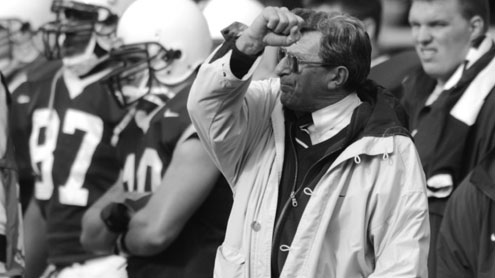 Yesterday, Joe Paterno passed away at the age of 85, and with him, so too does the old guard of college football.
Yesterday, Joe Paterno passed away at the age of 85, and with him, so too does the old guard of college football.
This isn’t a column remembering JoePa and his legacy, per se, because I’m too young to have even been alive for half of his career. Even Nick Saban pointed out to ESPN he was 15 the first time he saw Paterno lead Penn State onto the field against West Virginia.
No, this is a column about, as one 1983 interview called him, “Football’s Don Quixote.” Joe Paterno is a figurehead of sorts – a symbol of the counterforce that accompanies every object in motion. And though he was first dubbed football’s Don Quixote nearly 30 years ago, perhaps now we can fully understand the significance of that association.
In my mind, it’s more accurate – or easier, at least – to frame the comparison around a member of a different old guard: Peter O’Toole, in 1972’s “Man of La Mancha.”
While Quixote famously charged off to tilt with windmills, Paterno had his own allusion for battle. When asked why he admired conquerors, Paterno noted, “I’ve always been one who likes the thrill of battle, and I’ve always felt there was some correlation between getting an army to do things – the organization and motivation – and getting a football team to do them.”
The battle extended beyond the playing field, though, and I think this is where images of Miguel de Cervantes, lying in his bed exhausted with Sophia Loren by his side, begin to come into focus.
It’s always been acknowledged that Paterno was a force for good in college football, although the extent to which this is true never fully occurred to me until I read this interview.
The interviewer asked Paterno about the morality of college sports. He replied, “If an alumnus wants to buy a kid a car to get him to come to your school, that’s one thing, but when the university joins in, then you’re eating away at the fiber of education. And that worries me. We’re so cynical in all our institutions…If we ever want to start all over, we’ve got to start with the universities. And if people are cynical of those, you have no place to start over.”
I had the privilege of being present in Paterno’s post-game press conference following the 2010 game against Alabama. Alabama had just won 24-3 in a dominating performance. A visibly perturbed Paterno entered the room, and after the first question, let out a glimpse of the competitive fire that drove the man. He went on about how they weren’t prepared, how they “got their asses kicked,” how we all saw the game, so we should know what happened.
The press conference lasted all of a few minutes. It was a mythical experience for a 20-year-old kid. I can still hear his voice, raging at the reporter who dared to ask him what went wrong when he was right there at the game like everyone else.
I got the impression from those few minutes, and from looking back over his time at Penn State, that Paterno was a man who just understood. He understood what happened on the field. He understood the team he had and the environment he was in, both on the field that day and off the field in the age we live in. But he also looked like a man who just didn’t feel like explaining it anymore.
In 1983, the interviewer asked Paterno what his plan for reform would be if he were hypothetically named head of the NCAA.
“First, I’d throw out the book and start all over again. Because when that book was put together, amateurs were different than they are today. Everything is different. We didn’t have the pressure of professional sports that we do now,” Paterno answered.
“We didn’t have the pressure of agents, or television money, the pressure to cheat academically because you need an athlete who will make you big money on TV. We have too many rules now that are compromises on top of compromises on top of compromises.”
So, while the last months of his life were filled with turmoil, controversy and heart-breaking sadness, I can’t help but think of Peter O’Toole singing “The Impossible Dream” to his beloved Dulcinea.
To close, Joe Paterno was asked if he would ever take a job in the NFL.
“As for going pro, that could happen if – and some people consider this a feasible answer – we begin paying the kids to play. The minute that’s the answer, I’d be out of here. I couldn’t live with that.”
John Davis is the chief copy editor of The Crimson White. His column runs on Monday.









